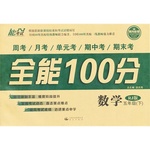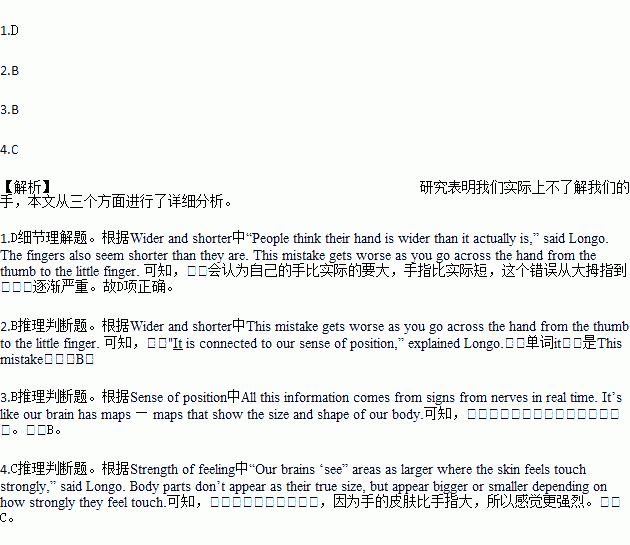题目内容
When we know somewhere well, we say we “ know it like the back of our hand ”. But new research has shown that we don’t actually know as much about our hands as we think we do.
Wider and shorter
Professor Matthew Longo at the University of London and his team did an experiment, covering the left hands of 100 people. Then they asked the people to point to where they thought their fingertips and knuckles (指关节) were. They made some quite big mistakes.
“People think their hand is wider than it actually is,” said Longo. The fingers also seem shorter than they are. This mistake gets worse as you go across the hand from the thumb to the little finger.
Sense of position
"It is connected to our sense of position,” explained Longo. This is our ability to tell where different parts of our bodies are, even when we can’t see them. “It tells us whether a joint is straight or not "he said. It also tells us whether we are going up or down in an elevator. All this information comes from signs from nerves in real time. It’s like our brain has maps — maps that show the size and shape of our body. “This experiment tried to find those maps,” said Longo.
Strength of feeling
But these maps make mistakes. These mistakes may be made because of how the brain understands different parts of the skin. “Our brains ‘see” areas as larger where the skin feels touch strongly,” said Longo. Body parts don’t appear as their true size, but appear bigger or smaller depending on how strongly they feel touch. Our lips, for example, have more nerves than our nose. So brain “sees” lips on its map of the body as being bigger than our nose. The same thing happens for other parts of the body that have lots of nerves.
Longo believes that more research in this area may help us to understand eating problem better, because people suffering from these problems may not know their bodies properly.
1.Which of following statement is TRUE about the experiment according to the article?
A. People think their body parts are larger than they actually are.
B. People’s fingers are actually shorter than they think.
C. People were asked to draw their hands from memory
D. People made more mistakes about their little fingers length than their thumbs’ length.
2.What does the underlined “it” in Paragraph 4 refer to?
A. The new experiment.
B. The mistake people made.
C. The sizes of fingers and hands.
D. The location information.
3.We can conclude from the article that ________.
A. the maps of people’s bodies form before they are born
B. the maps of our body are based on information from nerves
C. our sense of position depends on the interaction between parts of the body
D. how we feel about our body shape is only decided by our sense of position
4.We can infer from the article that ________.
A. there are more nerves in the finger than in the hand
B. our lips have a weaker sense of touch than our nose
C. the hand feels touch more strongly than fingers do
D. our sense of position should not be trusted because it is too often incorrect
 宝贝计划期末冲刺夺100分系列答案
宝贝计划期末冲刺夺100分系列答案 能考试全能100分系列答案
能考试全能100分系列答案
